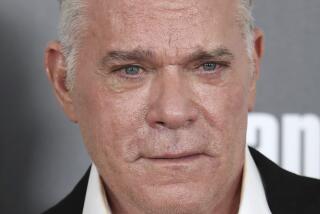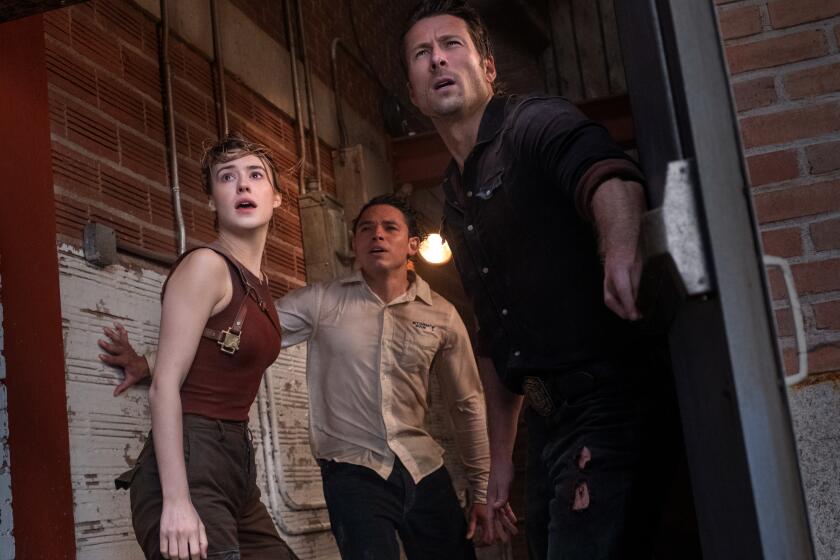All for the Sake of the Children
Lisa Gossels’ “The Children of Chabannes,” one of the most heartening Holocaust films ever made, continues the Laemmle Theaters’ current Documentary Days series, which has offered some of the year’s finest documentaries.
“Chabannes,” which screens at 10 a.m. Friday and Saturday at the Sunset 5, 8000 Sunset Blvd., West Hollywood,immediately brings to mind Pierre Sauvage’s “Weapons of the Spirit” in that it also chronicles a doughty French community that gave refuge to Jews during World War II.
Chabannes is a tiny village in the Creuse, a remote, beautiful and unspoiled region in central France with a strong spirit of independence, freedom and justice carried over from the early days of the French republic and reinforced by the precepts of Freemasonry.
Geographically and politically, it was the ideal location for the Ouvre de Secours aux Enfants, or OSE, a Jewish social service organization that brought 400 Jewish refugee children to the village between 1939 and 1943. Under the direction of Felix Chevrier, a Freemason and courageous journalist, the town’s fine old chateau became a home for the children, who ranged from 2 to 17.
Chevrier, who was 56 when he established the shelter, died in 1962, but four principal colleagues and his secretary appear in the film. They are the elegant and vivacious Paillassou sisters, Reine and Renee, who were local schoolteachers; Rachel Pludermacher, the first teacher recruited by the OSE to instruct Jewish refugee children, and Georges Loinger, also of the OSE, who forsook engineering to teach the children gymnastics so they would be fit if they had to run for their lives or survive a round-up. (The still-vigorous Loinger subsequently helped more than 1,000 Jewish children escape to Switzerland.)
These individuals help to explain how at least 250,000 Jews survived the war in France--even though the Vichy regime helped send 76,000 others to the death camps.
When Gossels, a seasoned documentarian whose father and uncle are Chabannes children, learned of a Chabannes reunion to be held in May 1996, she knew she had to make this splendid, informative and emotionally involving film about people, children and adults alike, who may seem ordinary but who rose to meet extraordinary demands that fate and circumstance demanded of them. Information: (323) 848-3500.
The film also screens Dec. 2 and 3 at 11 a.m. at the Monica 4-Plex, 1332 2nd St., Santa Monica. Information: (310) 394-9741.
*
Scott King’s ambitious and surreal “Treasure Island” concludes the Laemmle Theaters’ first annual film noir series, Darkness on the Edge of Town, with screenings Saturday and Sunday at 10 a.m at the Sunset 5. King imagines two World War II cryptographers: the beefy, macho Sam (Nick Offerman) and the slim, sophisticated Frank (Lance Baker), who are stationed in San Francisco on the site of the 1939 World’s Fair.
They begin to believe a corpse for whom they are composing letters of disinformation for the enemy is coming alive. Sam is working through his latent homosexuality in three-way encounters involving his wife and a series of men, while Frank indulges in two wives and a mistress.
Through his intricate plotting King means to skewer the sexual hypocrisy of the era as well as its racism, and he takes great pains to make his picture look authentic. It’s too bad it doesn’t have the brisk pace and lack of pretense that characterized Hollywood’s actual wartime serials and films noir.
*
Buster Keaton’s 1923 first feature, “The Three Ages” (Silent Movie, 611 N. Fairfax Ave., L.A., Friday through Sunday), is an amusing, very loose parody of D.W. Griffith’s 1916 landmark “Intolerance,” which intercuts boy-loves-girl stories in the caveman era, the Roman Empire and the present.
In each, the slight, somber but dogged Keaton pursues pretty Margaret Leahy despite the formidable presence of burly Wallace Beery, who wants the woman for himself.
Information: (323) 655-2520.
*
The American Cinematheque is presenting Wednesdays in Croatia, a weekly series running Wednesday through Dec. 20 at the Egyptian, 6712 Hollywood Blvd. Opening the series is Vinko Bresan’s “Marshal,” a major box office success on home ground that needs better subtitling and introductory remarks to become more accessible to foreign audiences. It’s clear enough, though, that Bresan has a breezy style and a pitch-black sense of humor.
On a small island off the coast of Croatia, a group of elderly men, World War II partisans who will always remain communists at heart, are burying one of their own when the ghost of Marshal Tito appears before them.
In satirizing both the exploitation of the former Yugoslavia’s past and a paranoid fear of its return, Bresan, who will be on hand to discuss his film, offers the alternative of a good-natured spirit of reconciliation.
Screening with it is Zvonimir Berkovic’s 1966 “Rondo,” a sly take on the eternal triangle that evolves as a judge (Stevo Zigon) commences playing chess every Sunday with an old friend (Relja Basic), a sculptor. Their moves on the board start echoing their behavior as the judge and the sculptor’s wife (Milena Dravic) become increasingly attracted to each other.
Information: (323) 466-FILM.
*
Gillian Armstrong’s rarely seen 1982 “Starstruck” screens Sunday at 7 p.m. in Melnitz Hall’s James Bridges Theater as part of the UCLA Film Archives’ Gotta Sing, Gotta Dance: Musicals from Around the World retrospective. It’s an all-stops-out contemporary musical with a nod to everybody from Busby Berkeley to Mickey and Judy--”Let’s put on a show!”--to the Beatles.
Jo Kennedy, a redheaded dynamo, dreams of rock stardom while working as a waitress at the family pub, hard by the Sydney Bridge. John Waters’ “Hairspray” (1988) replaces the previously announced “Can’t Stop the Music” (1980) as the second feature.
Information: (310) 206-FILM.
More to Read
Only good movies
Get the Indie Focus newsletter, Mark Olsen's weekly guide to the world of cinema.
You may occasionally receive promotional content from the Los Angeles Times.









